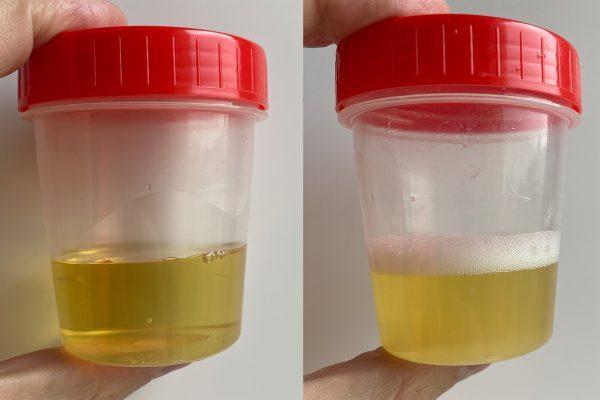Foamy Urine: What’s Normal and What’s Not? We often pay little attention to the appearance of our urine, but it can serve as a valuable indicator of our health. While variations in color and odor are relatively common, bubbling urine can be an alarming sight for many individuals. Though not always indicative of a severe problem, foam or bubbles in urine could signal an underlying issue. This article will explore why urine can sometimes appear foamy, ranging from harmless causes to more serious health concerns.

Understanding Bubbling Urine
Urine typically contains a small amount of proteins, which are not usually detectable by the naked eye. Foamy urine, often described as having excess bubbles or a frothy appearance, can result from proteinuria, the presence of abnormal levels of proteins in the urine. However, not all instances of bubbly pee are linked to proteinuria, and several other factors may contribute to its appearance.
Common Causes of Foamy Urine
- Dehydration: Dehydration is one of the most common and benign causes of bubbling urine. When the body lacks sufficient fluids, urine becomes more concentrated, potentially forming bubbles. Ensuring adequate hydration is crucial in preventing dehydration-related foamy urine.
- Urination Force: The force with which urine hits the water in the toilet can also create bubbles. More vital streams are more likely to produce foam, which is often a temporary and harmless occurrence.
- Dietary Factors: Certain foods can influence the appearance of urine. Excessive consumption of protein-rich foods, especially animal proteins, can lead to urine foamy. This is due to the increased presence of proteins that may pass into the urine. Excessive consumption of sugary foods or drinks may also contribute to foamy urine.
- Urinary Tract Infections (UTIs) can irritate the urinary tract, increasing mucus production. This excess mucus can create bubbles in the urine. In addition to having foamy urine, urinary tract infections (UTIs) may also cause other symptoms like pain while urinating, frequent urination, and discomfort in the abdomen.
Underlying Medical Conditions
While many cases of bubbly in urine are harmless and transient, there are medical conditions that can lead to persistent proteinuria and foamy urine. These conditions require medical attention and intervention:
- Kidney Disorders: Kidney diseases such as glomerulonephritis and nephrotic syndrome can cause significant proteinuria. These conditions damage the kidney’s filtering mechanisms, allowing proteins to pass into the urine. In these cases, Foamy urine is often accompanied by other symptoms like swelling, fatigue, and changes in urine output.
- Diabetes: If diabetes is not well managed, damage to the blood vessels in the kidneys may occur., which can hinder their ability to filter out excess fluids and waste products. Foamy and protein-rich urine may be present as a result of this.
- High Blood Pressure (Hypertension): Long-term hypertension can contribute to kidney damage, increasing the risk of proteinuria and foamy urine.
When to Seek Medical Attention
If you notice persistent foamy urine or suspect an underlying health issue, it’s advisable to consult a medical professional. A doctor can perform tests, such as urinalysis, blood tests, and imaging, to determine the cause of foamy urine and recommend appropriate treatment if needed.
Conclusion
While foamy urine can be unsettling, it’s essential to recognize that not all cases indicate serious health concerns. Benign factors like dehydration, urination force, and diet can contribute to frothy urine. However, persistent or recurrent bubbly urine should not be ignored, as it could be a sign of underlying medical conditions such as kidney disorders, diabetes, or hypertension. If you have any doubts or concerns, seeking medical advice is always a prudent step toward maintaining your overall health and well-being.


